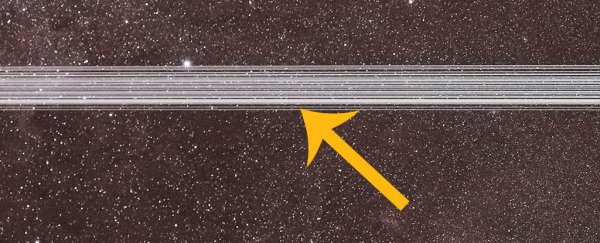The number of active satellites in the night sky has more than doubled since 2019 – from around 2,200 to 5,000. That is mostly due to Starlink, a SpaceX project aimed at providing internet anywhere in the world through 'mega-constellations' of satellites.
Since it began, Starlink has launched over 2,000 satellites. Unfortunately, the thousands of satellites needed to create such widespread internet coverage come with a tremendous downside: their reflective light streaks are literally obscuring ground-based astronomy.
Late last week, the International Astronomical Union (IAU) announced the establishment of a brand new center to unify astronomers and push back against mega-constellations, called the IAU Centre for the Protection of the Dark and Quiet Sky from Satellite Constellation Interference.
"I think it's really important, because it's projected that there are going to be 100,000 new satellites by the end of the decade," Flinders University space archaeologist Alice Gorman told ScienceAlert.
"The IAU center is critical because it will be able to coordinate information and international responses, and it will provide a strong single voice for the astronomy community."
Ground-based optical and radio astronomy needs a few conditions to probe the Universe. For optical telescopes, dark skies are required, far away from artificial light pollution or shiny satellites reflecting the Sun's rays.
Radio telescopes, on the other hand, need quiet. The Square Kilometer Array (SKA) Observatory, for example – one of the co-hosts of the new IAU center – listens out for a wide range of radio frequencies. Starlink and other broadband internet mega-constellations also use radio frequencies, some of which are in the same band as the SKA.
"A full constellation of Starlink satellites will likely mean the end of Earth-based microwave-radio telescopes able to scan the heavens for faint radio objects," Swinburne University astronomer Alan Duffy told ScienceAlert back in 2019 when the first Starlink satellites were launched.
The second co-host of IAU's new center is the National Science Foundation's NOIRLab, a US center for ground-based optical astronomy. This coming together of optical and radio groups towards this one purpose is a hopeful exercise that Gorman likens to the astronomical community lobbying against a military project called Project West Ford in the 1960s.
"We're basically looking at a battle royale between commercial satellite operators and astronomers," Gorman told ScienceAlert.
"We're being led to believe that without mega-constellations half the world won't have internet. Well, that is simply not true and people should be a lot more critical of the rhetoric around this."
The IAU has a lot of work ahead of it yet. The center has highlighted its focuses as keeping an eye on satellite constellations, working out how to remove them from images, engaging with industry, and suggesting satellite modifications which could limit astronomical issues.
This last one is important. Starlink already exists, and many other projects like OneWeb and Amazon's Project Kuiper are already in development.
As well as pushing back against new developments, it's also important for astronomers to work out how to live with these satellites now.
"It's not a question of satellites versus astronomy, but rather how to mediate the different needs and interests and values that coalesce in outer space, including those that are less powerful," Jessica West, a senior researcher on space security at Project Ploughshares, told Gizmodo.
"This requires open dialogue and coordinated and collective action. The international astronomy community is showing us how to do this. And the world is listening. This is a critical moment for space governance."
But with at least 100,000 satellites in our near future, Gorman suggests being wary of how this will not only affect astronomers, but all of us.
"Imagine going outside, and there are more dots of light representing a human made object than there are stars or planets," she said.
"We're taking away a fundamentally human way of experiencing the world by connecting to the night sky. It's not something to take lightly, that's something that requires thought, particularly if it's irreversible."
You can find out more about the work the Centre for the Protection of the Dark and Quiet Sky from Satellite Constellation Interference is doing here.
